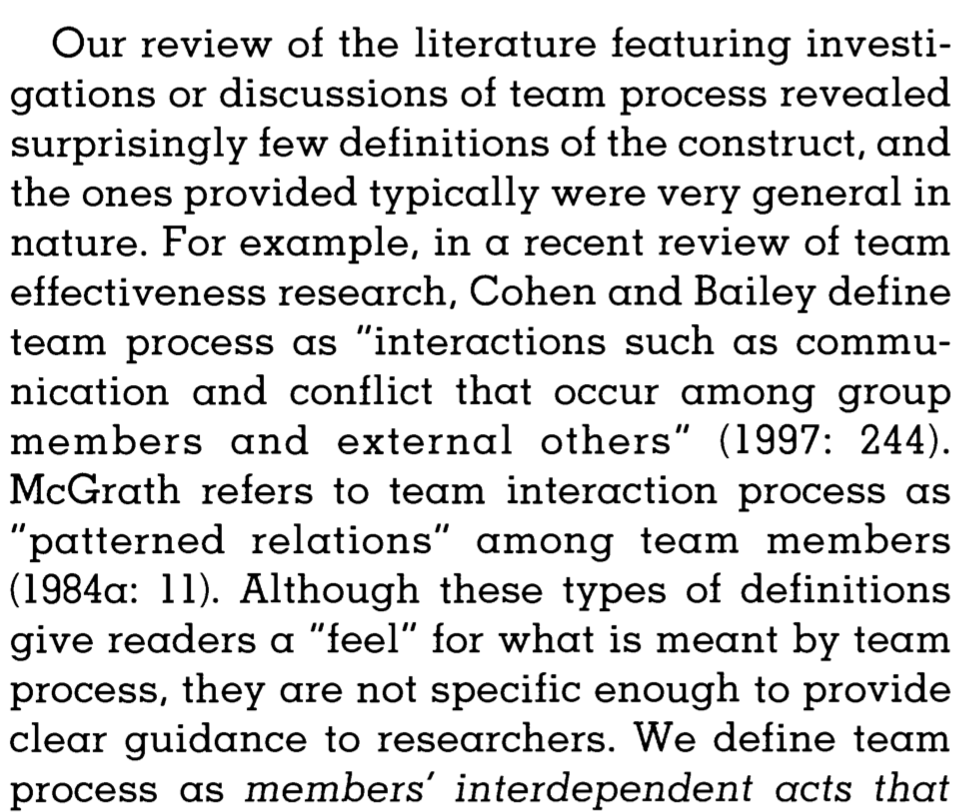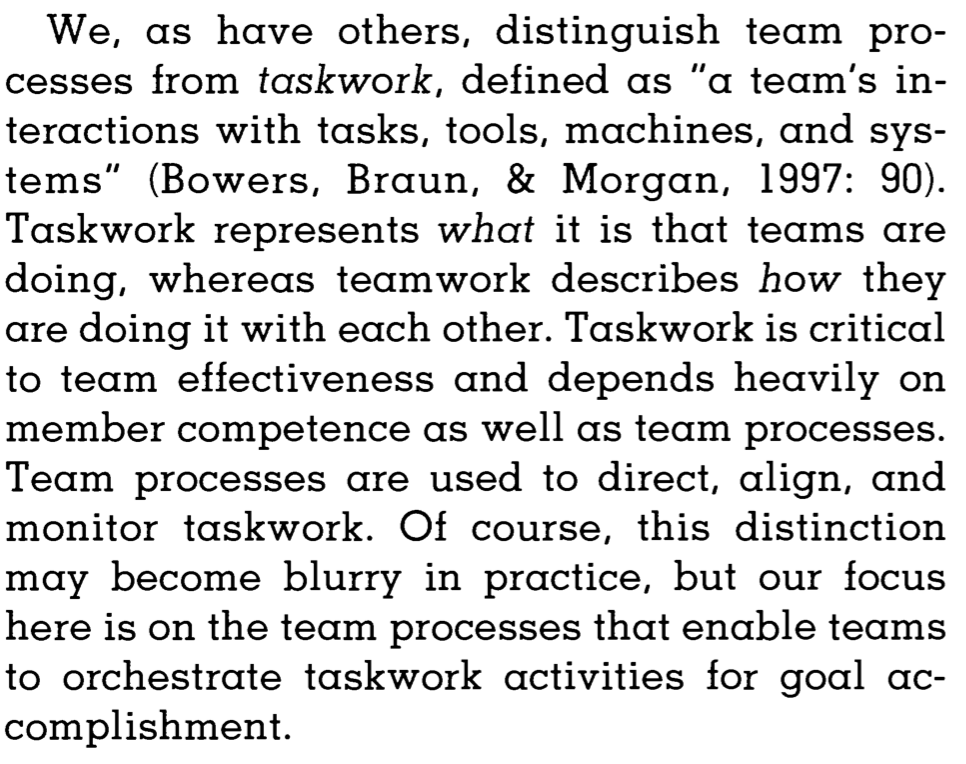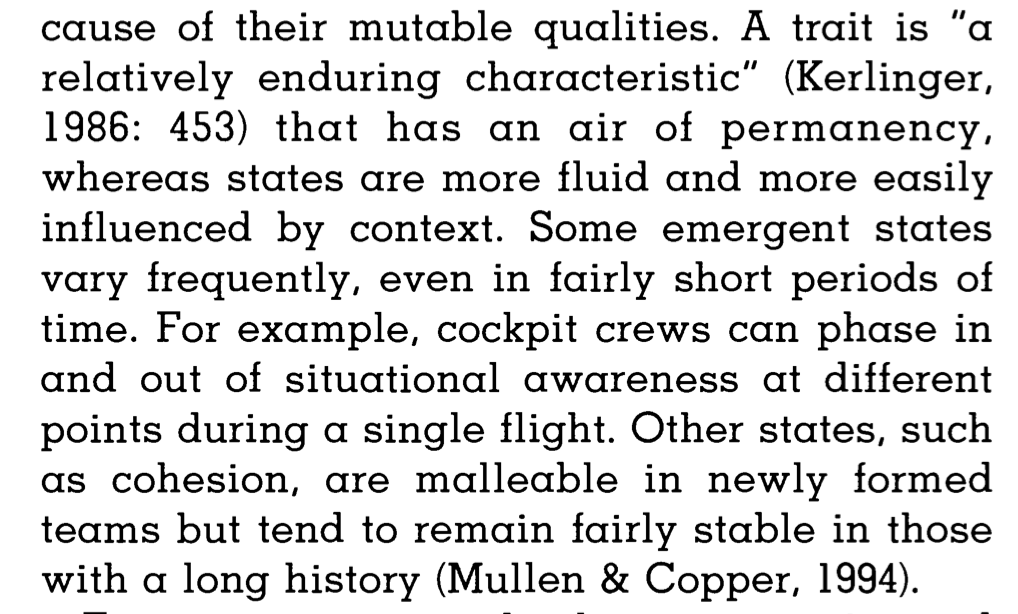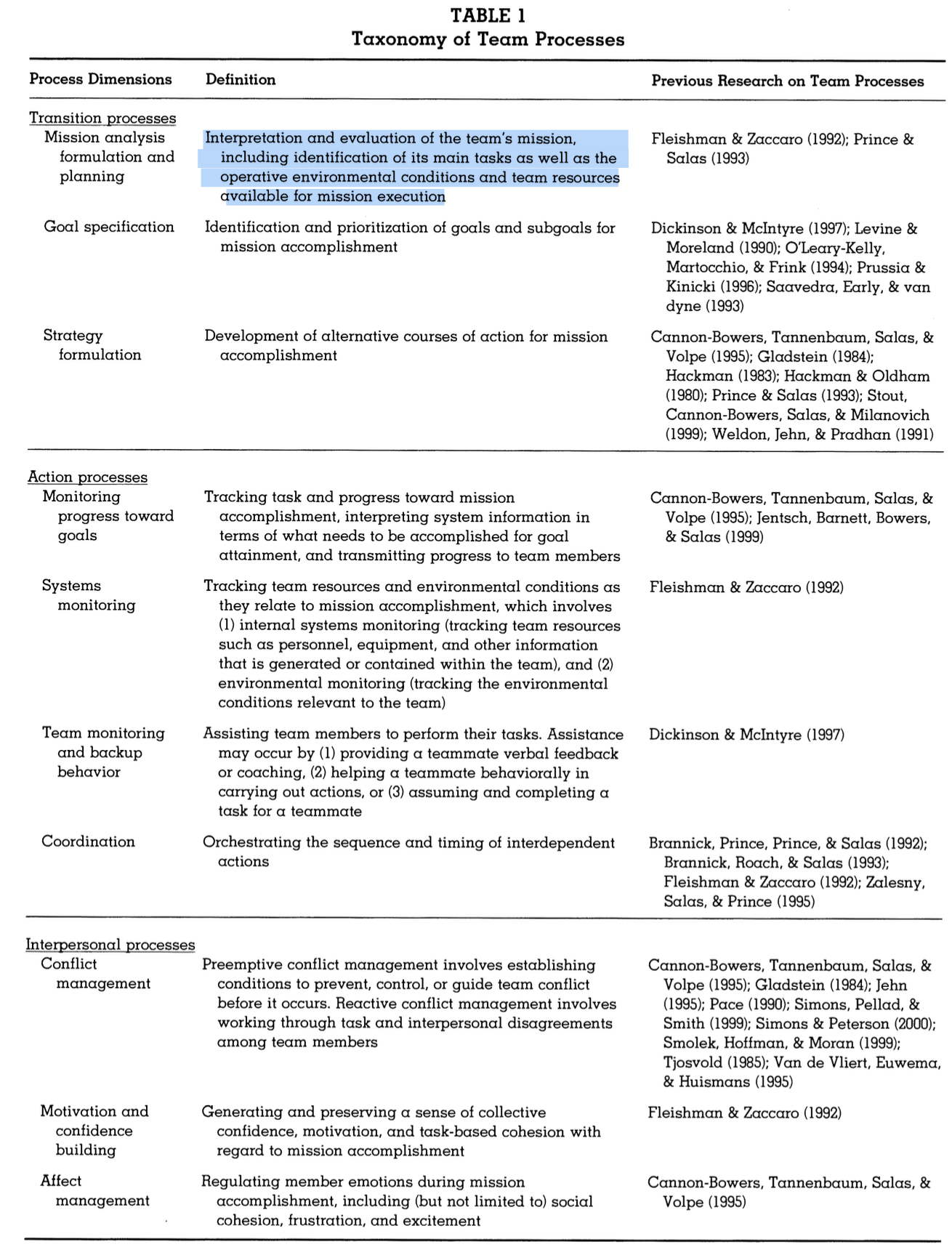Michael Shulman's Shared Notes
Powered by 🌱Roam Garden@Marks.Mathieu.ea2001TeamProcesses
Metadata::
- Author(s):: Michelle A. Marks, John E. Mathieu, Stephen J. Zaccaro
- Title:: A temporally based framework and taxonomy of team processes
- Type:: Article
- Publication:: Academy of management review
- Topics::
- Date:: 2001
- Date added:: December 4th, 2019
- Citekey:: Marks.Mathieu.ea2001a
- Zotero links:: Local library, Web library, Marks, Mathieu, Zaccaro (....pdf 🔗
- Tags:: ZoteroImport taxonomy team processes temporal
- Paper to introduce taxonomy of team processes, framed in transition, action, interpersonal phase. Also give a solid definition of team processes that seems to have stood the test of time, and was more nuanced and valuable than the ones to have been suggested previously.
Notes
Construct of team process
"We define team process as members' interdependent acts that convert inputs to outcomes through cognitive, verbal, and behavioral activities directed toward organizing taskwork to achieve collective goals" (p. 357) definition
 (p. 357)
(p. 357)
- Distinguish between team processes and taskwork teamwork
- Taskwork is what they do; teamwork is how they do it
- taskwork depends on competence on a task, and on teamwork
- team processes "direct, align, and monitor taskwork"
 (p. 357)
(p. 357)
- Taskwork is what they do; teamwork is how they do it
Processes vs. emergent states
- emergent states definition: "properties of the team that are typically dynamic in nature and vary as a function of team context, inputs, processes, and outcomes" (p. 357)
- different than team processes, which is only about team member interaction.
- Processes "guide the execution of taskwork." "Teamwork processes... orchestrate taskwork in employees' pursuit of goals." (p. 358)
- different than traits, which are stable - emergent states tend to change over time, although the degree of change can vary (p. 358)
- different than team processes, which is only about team member interaction.
- emergent states definition: "properties of the team that are typically dynamic in nature and vary as a function of team context, inputs, processes, and outcomes" (p. 357)
Model of team processes as a recurring series of phases
- Add temporal aspect to previous work that has summarized team processes.
- Specifically - temporal process as it relates to team goal accomplishment. That's different than Tuckman's (1965) stages of team development (norming, forming...)
- me Note - mention that one of the previous efforts, from Kozlowski, Gully, Nason, & Smith (1999) were about cycles that are used to develop learning skills. Steve has told me that his regret about this paper is that they didn't include learning. Did that earlier paper have learning in it?
- Introduce performance episodes (although interesting, first talk about 'episodes,' and just quietly transition) as "distinguishable periods of time over which performance accrues and feedback is available" (Mathieu & Button, 1992; no pg. number given, so seems quote is from present paper).
- Can be hard to parse out episodes sometimes - look to goals and periods of goal accomplishment.
- Phases can blend - and for different team types may blend more (i.e., project vs production vs service vs action vs managerial teams - Sunstrom's (1999) team types.)
- Teams usually have multiple performance episodes they are managing at the same time (McGrath, 1991)
- action phases are "periods of time when teams are engaged in acts that contribute directly to goal accomplishment (i.e., taskwork)" (p. 360) definition
- me Strange to me to see this called taskwork, when earlier they say taskwork is executing the task, and team processes, which I interpreted as teamwork, is about "directing, aligning, and monitoring taskwork" (p. 357).
- And a little later, they say "coordination and monitoring processes are likely to dominate the action phases" (p. 361). So something is unclear to me.
- transition phases are "periods of time when teams focus primarily on evaluation and/or planning activities to guide their accomplishment of a team goal or objective" (p. 360) definition
- me Strange to me to see this called taskwork, when earlier they say taskwork is executing the task, and team processes, which I interpreted as teamwork, is about "directing, aligning, and monitoring taskwork" (p. 357).
- Add temporal aspect to previous work that has summarized team processes.
Taxonomy of team processes
- Builds on Prince and Salas (1993); and Fleishman & Zaccaro (1992) (who in turn built on Nieva, Fleishman, & Rieck (1978)).
- Screenshot of table below; written out to follow:
transition processes
mission analysis / mission formulation / mission planning
- "Interpretation and evaluation of the team's mission, including identification of its main tasks as well as the operative environmental conditions and team resources available for mission execution" (p. 363 table, 365 text) definition
- Would happen during staff meetings, retreats, AARs
- Each team member thinks about their charge within the parameters of "team abilities, resources, and time constraints" (p. 365)
- Verbal discussions to get shared vision of purpose and objectives
- Includes both backward evaluation (AAR) and forward visioning
- Backward, we know that better they understand causes of previous performance, better can plan for future (Blickensderfer, Cannon-Bowers, & Salas, 1997)
- Forwards, interpreting future mission in context of environment
- If don't do this step, will work totally reactively, and will be undermined by changing circumstances; and their efforts may be misguided until too late (Gersick, 1988)
- me This sounds like a stage where teams would build shared interaction mental models and strategic models? Also, including AARs here means this includes the process of adaptation
- Edit - Not really. Seems to be more an overall first step - what are we dealing with, what have past successes looked like in a similar space (note, AI can inform this), how does that inform our plans for this. And the very specifics of how we'll get there are more part of strategy formulation.
- QUESTION where does team charter fit into this? More related to mission analysis, or to strategy formulation?
- "Interpretation and evaluation of the team's mission, including identification of its main tasks as well as the operative environmental conditions and team resources available for mission execution" (p. 363 table, 365 text) definition
goal specification
- "Identification and prioritization of goals and subgoals for mission accomplishment" (p. 363) definition
- Like SMART goals - it's exactly what the team would do. goal hierarchy?
- poor goals would be
- impractical
- vague
- conflicting
- not valued by team members
- Goals should be aligned with strategy.
- Believe timeline goes here.
- "Identification and prioritization of goals and subgoals for mission accomplishment" (p. 363) definition
strategy formulation
- "Development of alternative course of action for mission accomplishment" (p. 363) definition
- (Note - see below, it's not just alternate - includes principal course of action in subdimension of deliberate planning)
- Includes:
- Deciding how individuals will achieve their missions
- expectations
- me Why is this different than goal specification 👆🏻?
- communicate task-relevant info
- prioritization
- me Again - why is this different than goal specification👆🏻?
- communication of plans
- Should consider constraints of:
- time
- situation
- changing environment
- member expertise
- sequencing of actions
- me Is all this just more granular than mission analysis👆🏻?
- QUESTION where does team charter fit into this? More related to mission analysis, or to strategy formulation?
- Split into subdimensions:
- deliberate planning - the "formulation and transmission of a principal course of action for mission accomplishment" (p. 365) definition
- This could be the daily standup, figuring out what's up next and who will work on what.
- Based on current environmental info.
- This is the part of planning that is most commonly found in lit to date, on planning and strategy development
- contingency planning - "the a priori formulation and transmission of alternative plans and strategy adjustments in response to anticipated changes in the performance environment" (p. 366) definition
- If-then adjustments that will be made if things change - like if an event falls behind schedule. Plan B's.
- (Related - before action reviews, had that idea mentioned in one of Lauren Kuykendall's classes, to identify potential trigger events? premortem)
- If-then adjustments that will be made if things change - like if an event falls behind schedule. Plan B's.
- reactive strategy adjustment - "the alteration of existing strategy or plans in response to unanticipated changes in the performance environment and/or performance feedback" (p. 366) definition
- When you invent new plans on the fly. "occurs during action phases" (p. 366), in response to changing environmental demands, or to feedback that the current strategy isn't working.
- All of Elisa's work builds on this, where she separates into acting, monitoring, and recalibrating - so once that's incorporated, this process can probably be left out.
- When you invent new plans on the fly. "occurs during action phases" (p. 366), in response to changing environmental demands, or to feedback that the current strategy isn't working.
- deliberate planning - the "formulation and transmission of a principal course of action for mission accomplishment" (p. 365) definition
- "Development of alternative course of action for mission accomplishment" (p. 363) definition
action processes
- monitoring progress towards goals
- "Tracking task and progress toward mission accomplishment, interpreting system information in terms of what needs to be accomplished for goal attainment, and transmitting progress to team members" (p. 363) definition
- systems monitoring
- "Tracking team resources and environmental conditions as they relate to mission accomplishment, which involves..." (p. 363) definition
- ..."(1) internal systems monitoring (tracking team resources such as personnel, equipment, and other information that is generated or contained within the team), and..."
- ..."(2) environmental monitoring (tracking the environmental conditions relevant to the team)"
- "Tracking team resources and environmental conditions as they relate to mission accomplishment, which involves..." (p. 363) definition
- team monitoring and backup behavior
- "Assisting team members to perform their tasks. Assistance may occur by..." (p. 363) definition
- ..."(1) providing a teammate verbal feedback or coaching,..."
- ..."(2) helping a teammate behaviorally in carrying out actions, or..."
- ..."(3) assuming and completing a task for a teammate"
- "Assisting team members to perform their tasks. Assistance may occur by..." (p. 363) definition
- coordination
- "Orchestrating the sequence and timing of interdependent actions" (p. 363) definition
- monitoring progress towards goals
interpersonal processes
- conflict management
- "Preemptive conflict management involves establishing conditions to prevent, control, or guide team conflict before it occurs" (p. 363). definition
- "Reactive conflict management involves working through task and interpersonal disagreements among team members" (p. 363). definition
- motivation and confidence building
- "Generating and preserving a sense of collective confidence, motivation, and task-based cohesion with regard to mission accomplishment" (p. 363). definition
- affect management
- "Regulating member emotions during mission accomplishment, including (but not limited to) social cohesion, frustration, and excitement" (p. 363). definition
- conflict management

